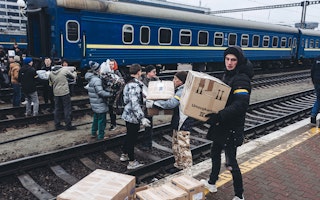Health Care on the Front Lines in Ukraine
By Viktoriia Tymoshevska

I am a physician by training, focusing on obstetrics and gynecology. I have been working on public health issues at the International Renaissance Foundation in Ukraine for the past 12 years. My husband, two children, and I live in Kyiv. Or, I should say that’s where I lived until four weeks ago, when Russian bombs forced me and my family to flee for our lives.
We heard the news of Russia’s massing on the border and its plans to invade. My father and husband sought to assure me the reports were overblown, that any aggression would be limited in scope, that we would be safe in our home in the nation’s capital. I was not so sure, and began stealthily packing the kids’ suitcases, sweeping the medicine cabinet, and collecting documents in preparation for a hasty departure. That moment came all too soon. The morning Russia invaded, we awoke to a call from a colleague: “Get out. It’s war.”
We hustled to a summer cottage some 30 kilometers outside Kyiv. The countryside felt safer; we had heat, water, and you could hear the birds overhead. But soon their sounds gave way to the noise of fighter jets, air battles directly overhead, a plane shot down not far from our house. Russians were ransacking neighbors. It was time to throw what we could in the car and make a run for safety in Lviv, a two-day journey of what used to be six hours’ drive, through bumper-to-bumper traffic, inching along past the burning carcass of a downed Russian fighter jet.
Throughout this harrowing journey, my colleagues and I have been able to continue operations. This is something we are very proud of. Ironically, we have the prolonged siege of COVID-19 to thank. We got used to working remotely, each of us knowing our roles. We were able to account for the safety and whereabouts of our team, and refined systems to ensure we could reach one another and our leadership. This enabled us to carry on with our work despite the bombs falling overhead. We joke that we are like bees, each of us doing our part and pulling together for the good of the hive.
The calls began immediately, as soon as the war started, and have continued to this day. The Ministry of Health had taken steps to prepare the health care system for the possibility of mass casualties, but no one was prepared for the extent of the carnage to come. I heard urgent pleas from the chief doctors at major hospitals in Kharkiv, Kyiv oblast, from partners and grantees: we need medicine. We need surgical supplies. Can you help provide humanitarian assistance? The logistics company driver left his job to join the fight; can you provide an ambulance instead of a regular truck to help ferry supplies to frontline health care providers?
Our board swung into action, releasing a statement reallocating significant sums to provide direct humanitarian assistance and aid evacuation efforts. We rushed to urge our grantees to repurpose funds, whatever their initial purpose, to address the wages of war.
Our work runs the gamut of public health challenges on the battlefield. Patient organizations—who typically monitor Ministry of Health and local departments of health on access to medicines and transparency of public funds—joined forces with pharmaceutical companies, working along with health officials to arrange for extraordinary mass donations of all kinds of medicines and distribution to hospitals, fleeing patients in the intermediate destinations and the front lines. One grantee that ran a shelter for victims of domestic violence moved to safer ground and doubled capacity, taking in women and children seeking safe haven amid the assault.
Another grantee, 100% Life, tends to the thousands of Ukrainians with HIV, and has offices in every large city in the country. They turned their offices into clinics and shelters and conducted training sessions on how to keep care coming and medicines moving—even if soldiers swarmed their streets.
Still others are hard at work facilitating evacuations, providing temporary shelter to those traveling west, providing food, water, clothing, blankets and other basic supplies.
I have been amazed at the fortitude of my civil society colleagues. Not once have I heard them complain, express frustration, or despair. The conversations I have had with grantees begins with “Slava Ukraini!” After checking to make sure one another is safe, we go right to our plans, how our support helps the people they serve—patients with chronic illnesses, children with disabilities, marginalized communities, people who use drugs. They are doing everything in their power to stand up to an unjust enemy and support their country.
The war story of one of my grantees stays with me. She works to combat discrimination against women and the elderly, and to provide social supports to those suffering with chronic conditions. We were staying houses just a few kilometers apart. Around the 10th day of the invasion, two rockets landed near her home, ripping off the roof and the porch. A few days later, she called me. “I’m in Lviv,” she said. “I’m starting up peer-to-peer support groups for women fleeing the war.” One of the women had lost a son and grandson in the attacks. Another had her house burned down by bombs. The grantee had tracked them down to begin providing support, and set up calls to women huddled in subway stations for shelter, offering psychological assistance. This level of mobilization, determination, and focus in the face of evil gives me goosebumps. It gives me hope, and fills me with pride in what our country is capable of. It is why, with the world’s help, Russia will never defeat Ukraine.
More from Open Society on Ukraine:
Viktoriia Tymoshevska is director of public health at the International Renaissance Foundation in Ukraine.

